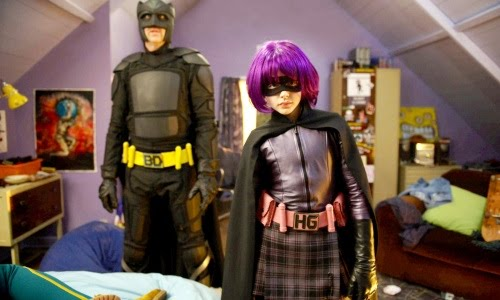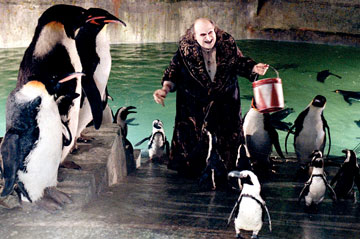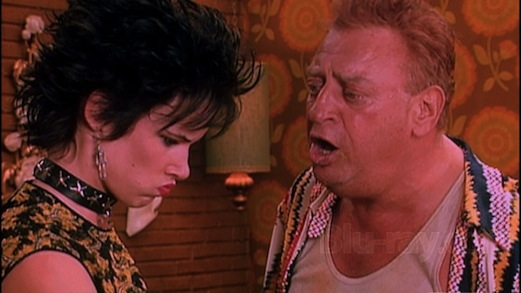Movies have oft-examined the extremes of dysfunctional parenting and the action-thriller Hanna presents a unique example. Hanna is a story about a CIA agent teaching his teenage daughter to be the ultimate assassin.
Hanna Heller would not be the first cinematic child trained to be an assassin: Hit-Girl was introduced to film fans last year, the 11-year-old played by Chloe Moretz who dispatches drug dealers and gangsters with violence and an incredible potty mouth. Her dad, Big Daddy (Nic Cage), taught his daughter from the age of four to be a ruthless killer, but made it a game, and his first scene in Kick-Ass is shooting her in the chest (if that does not hurt someone’s psyche then nothing will).
In TV land there is Sydney Bristow in Alias who has a strained relationship with her parents. Her mother was a KGB agent and her father put her in a program to turn her into a CIA sleeper. And I thought parents would discourage their children from being violent ...
Both Hanna and Kick-Ass have looked at the same subject, a father teaching their daughter to be a ruthless killer, yet take two different approaches. Hit-Girl is a comic book character and her story is treated to be more fun and for comedy. Hanna is going to be a more realistic spy story and sees a teenager who is raised in one way discovers her own humanity. But both have one similar theme, they are being used by their fathers to fulfil vendetta, and there is nothing more unsuspecting then an innocent looking girl. As the villain in Hanna says, “sometimes children are bad people too.”
Of course not every parent tries to teach their child to be a ruthless killers. The parents of Alex Delarge from A Clockwork Orange never questioned what their son was up to and he enjoyed such delightful activities as beating up tramps, robbing people, fighting rival gangs and raping women. It shows that a Laissez-Faire approach may not be the best approach, particularly when there are hooligans amok. It is an issue that keeps arising in the British tabloid press.
Parents have enabled their children’s criminal activities, sometimes without even realizing. Look at Sara Goldfarb in Requiem for a Dream whose son is a heroin addict whom she abuses and constantly steals from. Instead of talking to him or making others aware of the situation, she blindly sees Harry as being perfect. This allows him to continue with his addiction, but seeing that she loses her own marbles she is not setting the best example.
A recurring theme in Darren Aronofsky films is the dysfunctional nature of the family structure. In his recent hit Black Swan, he shows how one mother, Erica Sayers (Barbara Hershey), really screwed up her adult daughter, Nina (Natalie Portman). Erica is a woman who lives her dreams and ambitions of being a top ballet dancer vicariously through her daughter, making her practice for hours on end. But worse than just making Nina dance, Erica keeps her daughter in a permanent youthful state. Nina has the personality of a shy 13-year-old who is on the edge of exploding.
Another example of a parent being overbearing and their child causing mental problems is Marion Crane in Psycho. She had such an affect on her son Norman (*spoilers ahead!*) that he hears her voice his head and in his spare time dress us a woman and hacks people to pieces: whatever makes you happy.
A traditional way for parents to screw up their kids is abandoning them. There are many examples in film: a big one is Daniel Plainview in There Will Be Blood who was unable to deal with his son’s deafness so he put him on a train to San Francisco, and when they are reunited, their relationship was understandably a little strained.
Whilst There Will Be Blood took a more natural approach, Batman Returns took the parental abandonment to real extremes as a wealthy couple leave their deformed son in the sewer. Left to be raised by penguins, he becomes the psychotic supervillain, The Penguin, who ends up hell-bent on taking over Gotham City and killing all the first born infants in the city. Damn those evil penguins!
And finally the last movie parenting we will look at is abusive: both psychically and emotional. Countless examples exist, but rather than dwell entirely on the depressing, how about Homer Simpson and his son Bart? Homer expresses anger by strangling Bart (and that one act of child abuse has been one of the show's most popular gags), generally puts his son down and dares him to do stunts. As such, Bart rebels, making Homer’s life difficult and acts out at home and school — an underachiever and proud of it.
Another example is Ed Wilson who sexually abused his daughter Mallory in Natural Born Killerswhile her mother ignored it. Mallory gets her own back by killing mummy and daddy and goes on the run as a serial killer. Normally counselling and psychological help is a better way to deal with these
issues.
The subject of the family provides a wide range of material for filmmakers. For superhero and other types of action films, a tragic upbringing can a great motivation for a character, particularly villains. As well as being something to explain a character, the issues involving the family are interesting in themselves, a real look at the dark side of life. The family dynamic is a real source for independent filmmakers to use as either the focus of their story or as a subplot in the context of a wider plot. The domestic setting is offered an important part in any story and is often influenced by a filmmaker’s personal experience and beliefs. Remember every person and every family is different.
I could go on for a long time about other examples of dysfunctional parents, from Pamela Voorhees in Friday the 13th whose son also became a serial killer to the Drakes in X2 who enforced their anti-mutant views on their son, who ratted out his brother Bobby/Iceman to the police. But hopefully this has awakened you to the many examples of parenting as its portrayed in film.